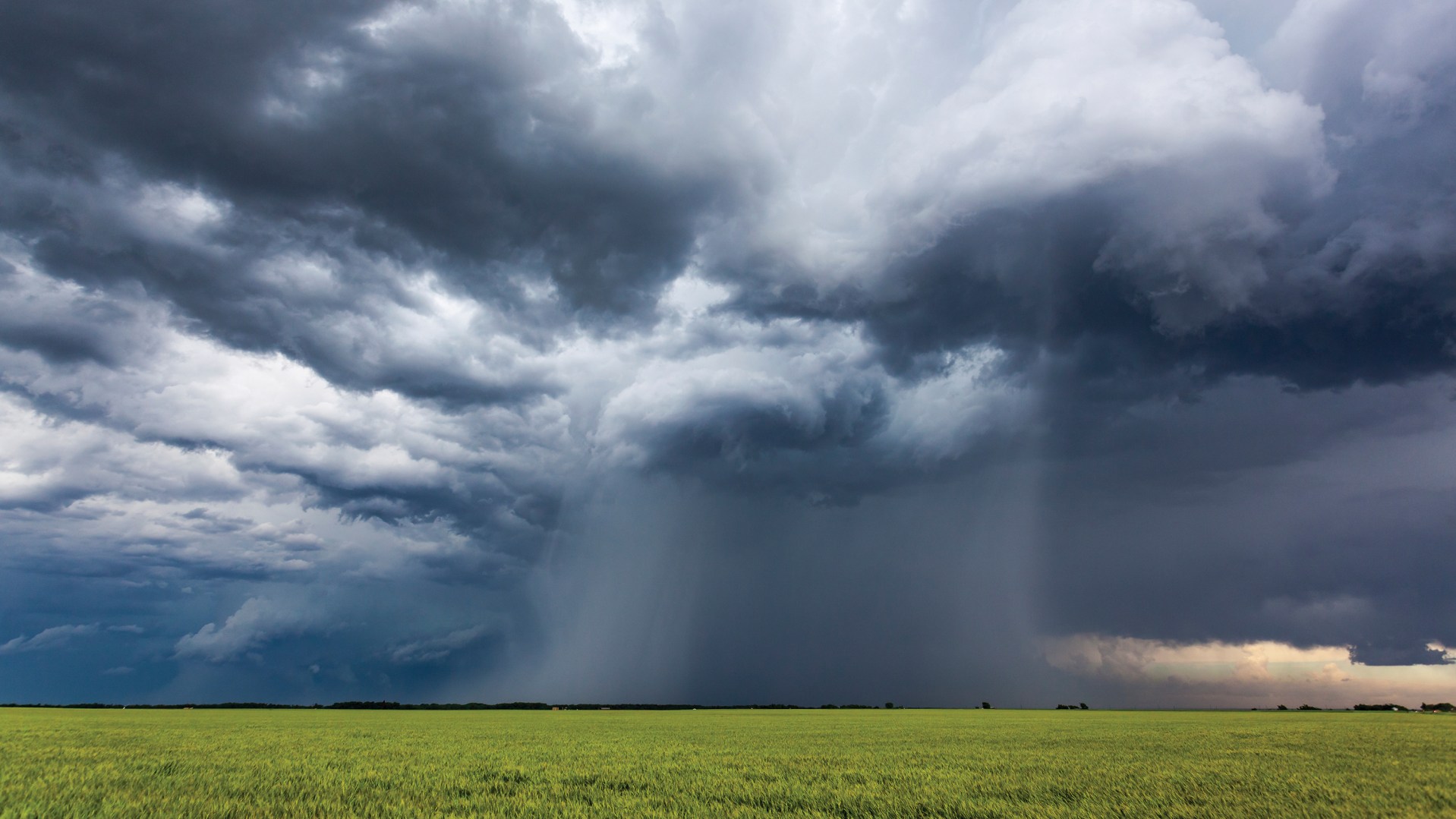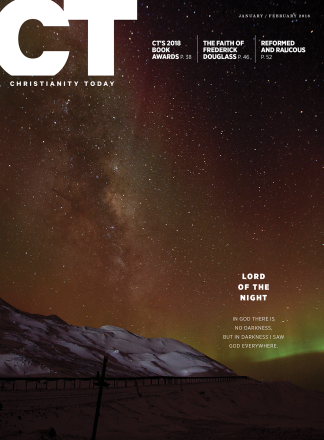Thomas P. Ackerman navigates a world of difficult questions and tense conversations. A geophysicist at the University of Washington and director of the Joint Institute for the Study of the Atmosphere and Ocean, he is at the forefront of research on geoengineering, a science that focuses on manipulating the environment to, among other ends, combat climate change. Ackerman thinks a lot about ethics as he researches how making clouds more reflective could compensate for a warming planet. He shared how a life spent trying to understand the climate has contributed to his understanding of God.
People often think of God as bringing the rain or the seasons. What does climate science say about God’s control?
One of the sections of the Bible that I’ve turned to the most often is the end of the Book of Job [38–40]. God talks to Job, and there is this beautiful series of scientific questions. And God says to Job: “Do you understand this? Do you understand this? Do you understand this?” And the answer of course, to all of them, is “No, I don’t understand them.” And Job ends up concluding, “All of this is too wonderful for me”—that the knowledge of God is beyond his knowledge.
I resonate with Job. There’s this sense that people have that science makes you less in awe of the power of God, and that’s just frankly a bad idea. People say, “Do you think God is in control?” I say, “Sure. Let’s talk about how God controls the weather not whether God controls the weather.”
This is where it really gets tricky: What’s the role of prayer in physical systems? Let’s take hurricanes. People see a hurricane trucking up the coast. They say, “We need to pray that the hurricane doesn’t hit here.”
And I say, “Okay, so, are you asking then that it moves a couple hundred miles north and that it sacks someone else? What are you praying for? Are you praying for that hurricane to go away?”
This is not some great mystery. [A hurricane] is the result of some physical laws that we can understand—we know 24 hours in advance where the hurricane is going to hit. God has put the laws in place by which this universe works. I’m not going to tell you that miracles don’t occur, but we don’t understand miracles. Miracles are outside the province of science.
How do you balance an understanding of God’s control of nature with our understanding of weather?
[Atmospheric particles known as] aerosols control the weather right now. If I look outside my window right now, there’s smoke everywhere in the Northwest [from forest fires]. That aerosol is having an effect on the weather. We’ve been two months without rain. That weather, those clouds, will be affected by aerosols. We know that human production of aerosols has changed the world and the weather.
We have cargo ships that steam across the Pacific, and they do more damage every day than what we’re talking about in our geoengineering experiments, attempting to control weather in some way, to bend the system to something that we think would be better for human civilization.
I’m amused by some of the people who say, “Climate change isn’t going to happen because God wouldn’t let it happen.” And at the same time, they’ll say, “You guys can’t do that because you’ll change the climate.” From a point of religious ethics, I don’t view geoengineering as much different than anything we’ve done before.
These are extremely challenging ethical questions, don’t get me wrong. We are venturing into some new territory.
What is solar climate engineering?
Solar climate engineering is the idea of cooling the planet by reflecting solar radiation in an attempt to compensate for warming due to increasing carbon dioxide concentrations. There are two viable techniques: to put aerosol into the stratosphere and to inject aerosol into marine boundary layer clouds over the ocean to make them more reflective.
The first thing you do is figure out how to make lots and lots of small particles. Then you put that sprayer on a ship or possibly an airplane. You can either inject them from the surface or fly in the marine boundary layer—the bottom 3,000 feet of atmosphere—and train those into the clouds. By adding these little aerosol particles, you change the properties of the clouds to make them have more drops and smaller drops, which are more reflective.
Basically, you’re evaporating water at the earth’s surface and raising it into the clouds. These low clouds over the ocean drizzle a bit back into the ocean. Locally, there’s not much change. But, if you do enough of this to cool the planet, you are going to slow down the hydrologic cycle. You’re going to make it rain less. The question of where that is and how important that is and whose rainfall is going to suffer are questions we don’t know the answer to yet. These questions are key in ethical discussions.
Your work deals with long horizons. Just testing could last up to 50 years. We live in a world where people want quick results. What has this taught you about human nature?
Any scientist who works on climate is always thinking about the long term. We don’t worry about what happens on the year-to-year basis. That’s not climate. That’s weather.
As a society, we struggle with instant gratification, and we lose interest if we can’t solve something. That’s why the US government agreed to underwrite basic research in this country, because no company is going to invest in something says, “Maybe we’ll know the answer in ten years.” The questions that we’re engaged in have long time-horizons.
Karl Popper, a philosopher of science, says that what we’re really doing is trying to learn how to ask more specific questions. We’re trying to take these vague questions—can you do geoengineering?—and we ask tighter, more straight-forward questions that we can answer and accumulate our knowledge.
But here’s the problem we have: We’re increasing our knowledge, but our knowledge is finite and our ignorance is infinite. The increase in our knowledge of the climate system, of the biological system, of everything has grown enormously. We understand tons of stuff. We’ve been conscious of what we don’t know.
Why should Christians care about climate change?
I’ve spent a lot of time over the last decade talking to people of faith about climate change. I belong to that tribe. And I am constantly struck by the fact that the reception I get from my tribe is worse than the reception I get from other tribes.
The vast consensus of the scientific community is that (a) we understand the physical processes, (b) we’re adding greenhouse gases into the atmosphere, (c) if you do that, it’s going to warm up, and (d) we have evidence that it’s warming.
The real question is: Why is the church not standing up at the forefront of this discussion saying, “This is God’s world. These are my neighbors.” What did Jesus say the two great commandments are? He said, “Love God and love your neighbor.” When we disagree about climate change, we are doing damage to both of those. We are saying we don’t respect God’s command to us to love and take care of his creation. We are disrespecting the command to love our neighbor because the effects of climate change are going to fall disproportionately on the poor and disadvantaged.
Some people say we don’t need to bring up climate change when we’re really talking about creation care. Can’t we just talk about creation care?
I don’t have any problem with framing an issue with creation care, in terms of caring for God’s creation in all of its ramifications. We should care about creation—water pollution, air pollution, soil degradation. I could list 55 other things. The Christian church leads on none of them.
Let’s develop a healthy understanding of what we mean by creation care, and let’s not divorce it from social justice. For example, why do we put our waste and chemical dumps in the neighborhoods of poor people? Why isn’t the Christian community saying, “Hey, that’s not right”?
What the church shouldn’t say is: “Oh, well, we don’t want to talk about climate change because people might be upset about that.” We do need to deal with climate change. We are all too willing to sit back and allow the discussions to be framed by the deniers.
Rebecca Randall is the science editor at Christianity Today.
Learn something new from this interview? Did we miss something? Let us know here.










